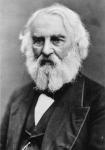 |
| Henry Wadsworth Longfellow (http://www.hwlongfellow.org/life_overview.shtml) |
“When the hours of Day are numbered, and the voices of the Night. Wake the better soul, that slumbered, to a holy, calm delight”. These thought provoking words come from the pen of the accomplished poet and professor, Henry Wadsworth Longfellow. Although Longfellow’s reputation as a poet has greatly diminished, he continually remains one of the most thought provoking writers in the world. Longfellow proves to set a high standard that many poets fail to live up to. His self-sacrificing, persevering character is rarely seen in today’s society, and provides an admirable model of excellence, endurance and confidence.
Henry Wadsworth Longfellow, the second of eight children, was born to Stephen and Zilpah Longfellow, on February 27, 1807. At the age of six, Longfellow attended the private Portland Academy. While there, he became quite accomplished in his studies and in Latin. Many who made an acquaintance of him, knew him to have a bright imaginative mind, and a cheerful fortitude. His older brother Samuel said of him, “In truth he was a very lively and merry boy, though of refined and quiet tastes. He did not like the ‘rough and tumble’ to which some of his schoolmates were given” At the tender age of thirteen, Henry secretly published his first poem “The Battle of Lovell’s Pond” in the “Portland Gazette”. His father, not knowing Henry had written it, harshly criticized the poem, and Henry became rather discouraged. However, he refused to give up his writing future even in the face of criticism.
Samuel and Henry Longfellow moved to Brunswick, Maine, to attended Bowdoin College. They both graduated in 1825, and traveled on to other adventures. Henry’s father wished him to enter into law, but, recognizing Henry’s enthusiasm for language and writing, allowed him to explore different parts of the world, and keep up his studies for three years. Upon returning, Henry Longfellow began his career as a professor, teaching French, Spanish and Italian. He married Mary Storer Potter, and enrolled at Harvard to improve his language skills. But when Mary died from a complication of a miscarriage, Longfellow abandoned his studies, and sank into a deep state of suicidal despair. He mournfully wrote “Footsteps of Angels” in Mary’s honor. Fortunately, he met and fell deeply in love with Fanny Appleton, but Fanny had no thoughts of marriage at the time, and remained unmovable for seven years. Meanwhile, Longfellow’s reputation as a poet grew rapidly, and soon afterward, Fanny did accept his marriage proposal, and eventually bore him seven children: Charles, Ernest, Fanny, Alice, Edith and Anne.
Henry Longfellow published a great deal of influential poetry. “Outre-Mer: A Pilgrimage Beyond the Sea” was published in 1835, “Voices of the Night: Ballads; and Other Poems in 1839, and “Poems on Slavery” in 1842. Longfellow gave up his duty of teaching in 1854, and focused the bulk of his attentions on perfecting his poetry skills. Fanny Longfellow tragically passed away in 1861, her dress catching on fire from a candle. Henry Longfellow mourned her death and wrote “The Cross of Snow” nearly twenty years afterward, obviously still grieving his dear wife's departure. Some of his well-known works are “Household Poems” in 1865, “Flower-de-Luce” in 1867, and “Paul Revere’s Ride” in 1861. Longfellow died at his abode in Cambridge on March 24, 1882. In 1884, he became the first recognized citizen of the United States to ever have achieved an honored memory in the Poets’ Corner of Westminster Abbey.
Henry Wadsworth Longfellow left an inspiring impression upon the world. In many of his works, he points mankind toward a better view of morality. Henry once said, “The life of a man consists not in seeing visions and in dreaming dreams, but in active charity and in willing service”. Through his life, writings, and perseverance, Longfellow portrayed an eloquent, optimistic understanding of the importance of language and literature. He personally broke the barrier of discouragement, amidst the disappointments in early writing, and the grief of his wives' deaths. Henry Wadsworth Longfellow refused to lower the bar, and set the example of endurance, for his country, and for the world.
One of Henry’s influential poems is… A Psalm of Life:
Tell me not in mournful numbers,
Life is but an empty dream!
For the soul is dead that slumbers,
And things are not what they seem.
Life is real! Life is earnest!
And the grave is not its goal;
Dust thou are, to dust thou returnest,
Was not spoken of the soul.
Not enjoyment, and not sorrow,
Is our destined end or way;
But to act, that each tomorrow
Find us farther than today.
Art is long, and Time is fleeting,
And our hearts, though stout and brave,
Still, like muffled drums, are beating
Funeral marches to the grave.
In the world's broad field of battle,
In the bivouac of Life,
Be not like dumb, driven cattle!
Be a hero in the strife!
Trust no Future, howe'er pleasant!
Let the dead Past bury its dead!
Act, - act in the living Present!
Heart within, and God o'erhead!
Lives of great men all remind us
We can make our lives sublime,
And, departing, leave behind us
Footprints on the sand of time;
Footprints, that perhaps another,
Sailing o'er life's solenm main,
A forlorn and shipwrecked brother,
Seeing, shall take heart again.
Let us then be up and doing,
With a heart for any fate;
Still achieving, still pursuing,
Learn to labor and to wait
Page created on 3/17/2011 12:00:00 AM
Last edited 3/17/2011 12:00:00 AM
